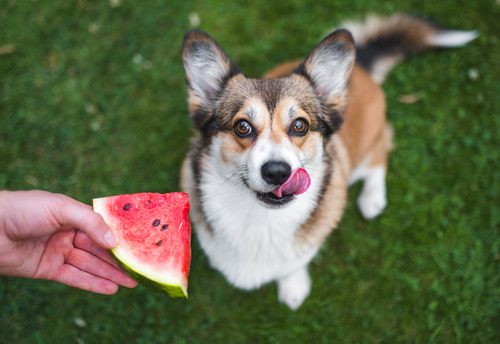Can Dogs Have Watermelon?
When summer arrives and watermelons fill the produce aisles, many pet parents wonder: “Can dogs have watermelon?” The answer isn’t as simple as yes or no, and understanding the details can help you make safe choices for your pet. This refreshing fruit can be a treat in the right circumstances, but it also has parts that are not safe for dogs. In this blog, we’ll explore everything you need to know about dogs and watermelon, so you can feel confident the next time you slice one open.

Why Pet Owners Ask: Can Dogs Have Watermelon?
Watermelon is sweet, juicy, and hydrating, making it one of the most popular fruits in the summer months. Since dogs are often curious about what their humans are eating, it’s natural to ask: “Can dogs have watermelon?” The short answer is yes, but with certain rules. The fruit itself can be safe in moderation, but the rind and seeds can pose risks.
Dogs process fruit differently than humans, and while watermelon is low in calories and contains helpful nutrients, it should only be given as an occasional treat. Knowing what parts are safe and what to avoid is key to keeping your pet happy and healthy.
Nutritional Benefits of Watermelon for Dogs
When people ask, “Can dogs have watermelon?”, one of the main reasons is because they want to share healthy foods with their pets. Watermelon contains vitamins, minerals, and water content that can benefit dogs in small amounts.
Vitamins and Minerals
Watermelon is rich in vitamins A, B6, and C. These vitamins support normal body functions, from skin and coat health to immune support. Dogs don’t rely on fruit for these nutrients in the same way humans do, but a small snack of watermelon can add variety to their diet.
Hydration Boost
With more than 90% water content, watermelon is highly hydrating. On a hot day, dogs can enjoy a small piece of watermelon as a refreshing treat. While it should never replace fresh drinking water, it can provide extra hydration during warm months.
Low in Calories and Fat
Another reason pet parents ask “Can dogs have watermelon?” is because they’re looking for low-calorie snacks. Unlike processed dog treats, watermelon is naturally low in fat and calories, making it a guilt-free option when shared in moderation.
What Parts of Watermelon Are Safe vs. Unsafe for Dogs?
Before answering “Can dogs have watermelon?” completely, it’s important to separate what’s safe from what’s unsafe. Not every part of a watermelon is dog-friendly.
The Flesh
The pink, juicy flesh is the safe portion of the fruit. Small, seedless cubes or slices (without rind or seeds) are the best way to offer watermelon to your dog.
The Seeds
Seeds can be a choking hazard or cause intestinal blockage if swallowed in large amounts. While one or two might not be harmful, it’s best to remove them before sharing watermelon with your dog.
The Rind
The tough, green rind is not safe for dogs. It can be difficult to chew, hard to digest, and may lead to gastrointestinal upset or blockages. Always discard the rind and only serve the soft, pink inside.
How Much Watermelon Can Dogs Eat?
Another important consideration when asking “Can dogs have watermelon?” is portion size. Even though the fruit is safe in moderation, too much can lead to stomach upset.
Treat, Not a Meal
Watermelon should be considered a treat, not part of a dog’s main diet. Treats, including fruit, should make up no more than 10% of a dog’s daily food intake.
Serving Sizes
- Small dogs: A few small cubes.
- Medium dogs: Several small pieces.
- Large dogs: A handful of seedless chunks.
Moderation Matters
Even healthy foods can cause diarrhea or discomfort if dogs eat too much. Start small to see how your dog reacts before offering larger portions.
Fun Ways to Offer Watermelon to Dogs
Sharing watermelon doesn’t have to be boring. When wondering “Can dogs have watermelon?”, many pet owners also want to know fun and safe ways to prepare it.
- Fresh Cubes: Cut seedless watermelon into small cubes and offer them as training rewards or snacks.
- Frozen Bites: Freeze bite-sized watermelon pieces for a refreshing, dog-friendly popsicle on hot days.
- Blended Treats: Puree seedless watermelon and freeze it in ice cube trays. You can even mix in plain yogurt for an extra treat.
These options provide variety while ensuring the fruit is offered in safe, digestible portions.
When to Avoid Giving Watermelon to Dogs
Although the answer to “Can dogs have watermelon?” is usually yes, there are times when it might not be the best choice.
Sensitive Stomachs
Some dogs have sensitive digestive systems that may not handle fruit well. Even a small amount of watermelon could cause soft stools or diarrhea.
Pre-Existing Health Conditions
Dogs with certain medical conditions may need to avoid fruit altogether. Always talk with your veterinarian before introducing new foods to your dog’s diet.
Excess Sugar
While watermelon is natural, it still contains sugar. Too much can be a problem, especially for overweight dogs or those with health concerns.
Safe Alternatives to Watermelon
Sometimes the answer to “Can dogs have watermelon?” is yes, but pet owners also want to explore other fruit options. Many fruits can be safe for dogs in moderation.
Other Dog-Safe Fruits
- Blueberries
- Strawberries
- Apples (without seeds)
- Bananas
Fruits to Avoid
- Grapes and raisins (toxic to dogs)
- Cherries (pits can be dangerous)
- Citrus fruits (can cause stomach upset)
If watermelon isn’t available, these alternatives can be safe choices when given properly.
Talk With Your Veterinarian About Watermelon and Your Dog
So, can dogs have watermelon? Yes, in moderation, the juicy pink flesh of seedless watermelon can be a safe and refreshing treat. However, the rind and seeds should always be avoided. Every dog is different, so what works for one may not work for another. If you’re thinking about offering watermelon to your dog and want professional guidance, Lane Veterinary in Hinsdale, IL, is here to help. Call us at (630) 320-6644 or book an appointment online. Our veterinary team can discuss your pet’s diet, recommend safe treats, and answer any questions you have about sharing fruit with your dog.
Recent Posts
About Us
Choosing a vet means entrusting your pet’s care and well-being to capable hands. Lane Veterinary strives to be a lifetime vet for you and your family, being the people you can always lean on for support and guidance. As a privately owned practice, we stand to give people and their pets the one-on-one care and attention they deserve in a calm and comfortable setting.
